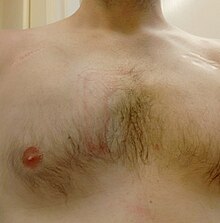This article needs more reliable medical references for verification or relies too heavily on primary sources. (January 2022) |  |
| Cardioversion | |
|---|---|
 Illustration of cardioversion | |
| Specialty | Cardiology |
| ICD-9-CM | 99.6 |
| MeSH | D004554 |
| MedlinePlus | 007110 |
Cardioversion is a medical procedure by which an abnormally fast heart rate (tachycardia) or other cardiac arrhythmia is converted to a normal rhythm using electricity or drugs.
Synchronized electrical cardioversion uses a therapeutic dose of electric current to the heart at a specific moment in the cardiac cycle, restoring the activity of the electrical conduction system of the heart. (Defibrillation uses a therapeutic dose of electric current to the heart at a random moment in the cardiac cycle, and is the most effective resuscitation measure for cardiac arrest associated with ventricular fibrillation and pulseless ventricular tachycardia.[1]) Pharmacologic cardioversion, also called chemical cardioversion, uses antiarrhythmia medication instead of an electrical shock.[2]

- ^ Marino PL (2014). Marino's the ICU book (Fourth ed.). Wolters Kluwer Health/Lippincott Williams & Wilkins. ISBN 978-1451121186.
- ^ Shea JB, Maisel WH (November 2002). "Cardiology patient pages. Cardioversion". Circulation. 106 (22): e176–e178. doi:10.1161/01.CIR.0000040586.24302.B9. PMID 12451016.